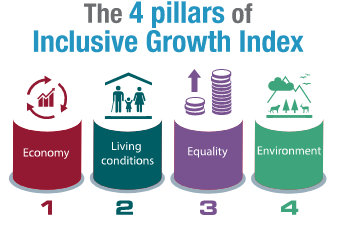Prioritizing Human Development: A Path to Inclusive Growth (GS Paper 3, Planning, mobilisation of resources, growth, development and employment)

Introduction: The Challenge of Rising Inequality
- India stands at a crossroads, grappling with the stark reality of widening income disparities and sluggish progress in human development indicators.
- As recent studies highlight the growing chasm between the affluent few and the marginalized majority, it becomes imperative to reassess the nation's development trajectory and prioritize human welfare over mere economic gains.
A Poor Ranking on Human Development Index
- Despite incremental improvements, India's position on the Human Development Index (HDI) remains a cause for concern.
- While climbing one spot to rank 134 out of 193 countries in 2022, the nation lags behind its regional peers such as Bhutan, Bangladesh, Sri Lanka, and China.
- Particularly alarming is the gender gap in labor force participation, reflecting deep-rooted disparities that hinder inclusive growth.
Concerns on Rising Inequality
- The Human Development Report and the World Inequality Lab study underscore the ominous trend of escalating inequality, both within and across nations.
- As economic power becomes increasingly concentrated in the hands of a privileged few, the majority grapples with limited agency and access to opportunities.
- This disparity not only stifles social mobility but also undermines the fabric of democracy and equitable progress.
Addressing the Widening Divide
- The staggering income divide, where the bottom 50% of the population commands a mere 15% of the national income, demands urgent attention.
- Such stark inequality not only dampens aggregate demand and consumption but also perpetuates cycles of poverty and exclusion.
- Moreover, burgeoning household debt levels and dwindling financial savings underscore the fragility of the economic landscape, necessitating a paradigm shift in growth strategy.
Charting a New Course: Prioritizing Human Development
- To reverse the tide of inequality and foster inclusive growth, India must pivot towards a development model that places human welfare at its core.
- This entails recalibrating policies to address the multifaceted challenges facing the populace, from access to quality education and healthcare to equitable employment opportunities and social protection schemes.
Fostering Political Will for Long-term Sustainability
- Such a transformation demands political will and foresight, transcending short-term electoral gains in favor of sustainable and equitable development.
- By investing in human capital and nurturing a conducive environment for innovation and entrepreneurship, India can unleash the latent potential of its vast populace and chart a course towards prosperity for all.
Conclusion: A Call to Action
- As India navigates the complexities of a rapidly evolving global landscape, the imperative to prioritize human development cannot be overstated.
- By bridging the gap between rhetoric and action, policymakers can lay the groundwork for a more resilient and inclusive society, where every citizen has the opportunity to thrive and contribute meaningfully to the nation's progress.
- It is time to embrace a paradigm shift towards a future where prosperity is measured not merely in economic terms but in the holistic well-being of its people.


